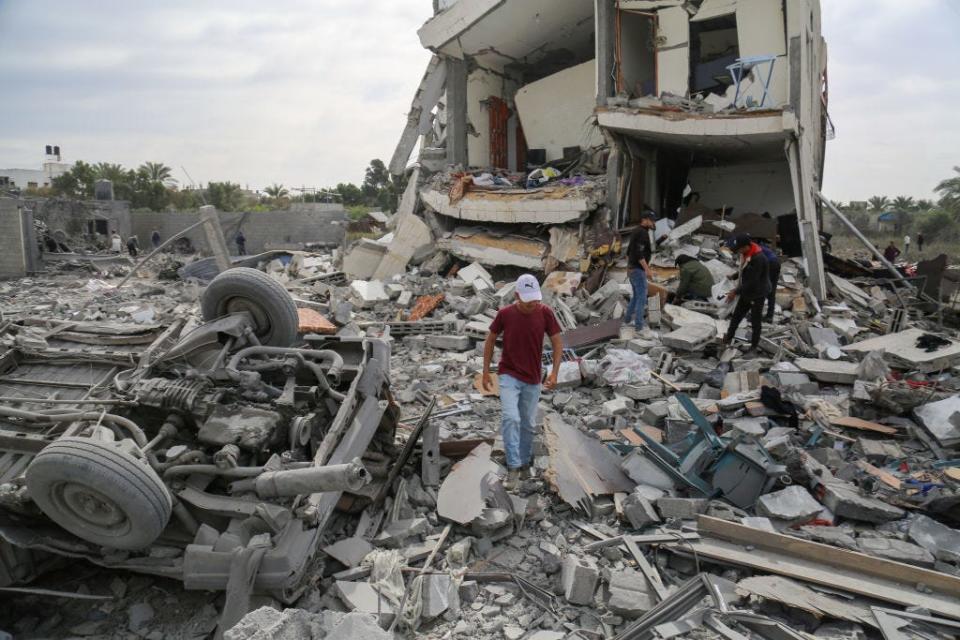Tension between the US and Israel boil as UN ceasefire vote passes and Netanyahu vows to push ahead with Rafah offensive
The UN passed a vote calling for a ceasefire in Gaza, with the US abstaining for the first time.
Netanyahu cancelled meetings with Biden officials in response, further damaging US-Israel relations.
Negotiations around Rafah are crumbling, with Netanyahu saying troops will invade without US help.
The divide between the US and Israel is deepening after the United Nations passed a ceasefire vote, a first for the international body after multiple failed attempts.
The result of the UN vote was met with a fiery response from Israeli Prime Minister Benjamin Netanyahu, who cancelled high-priority meetings with the White House about plans for an upcoming Rafah offensive. Although there have been riffs, recent developments represent likely the greatest fracture in US-Israel relations since the war began last October.
Tensions began to boil over Sunday night, when Netanyahu publicly threatened to cancel the White House meetings before the UN vote, demanding the US veto the ceasefire resolution. Part of Netanyahu's complaint against the resolution, his office said, was the call for a ceasefire wasn't tied to an agreed release of Israeli hostages from terror group Hamas.
Later the next morning, the UN Security Council passed the resolution, calling for an "immediate ceasefire" in Gaza. 15 members voted in favor, while the US abstained from the vote — a seemingly notable shift from its previous position.
The move led Netanyahu to see his threat through and cancel an Israeli delegation's trip to Washington DC later this week to talk with White House officials about alternative plans for a Rafah offensive.

"The United States has abandoned its policy in the UN today," Netanyahu's office said in a statement posted on X. "Just a few days ago, it supported a Security Council resolution that linked a call for a ceasefire to the release of hostages," which China and Russia vetoed "partly" because they oppose such a deal, his office added.
Prior to the Monday vote, the UN Security Council had failed multiple times to pass a call for a ceasefire in the deadly conflict that has devastated much of Gaza. The US had vetoed several attempts, saying such a move could be wrong while Israel and Hamas carefully negotiate hostage releases. It also proposed its own resolution last week, which China and Russia both vetoed.
"Regrettably," Netanyahu's office said, "the United States did not veto the new resolution, which calls for a ceasefire that is not contingent on the release of hostages. This constitutes a clear departure from the consistent US position in the Security Council since the beginning of the war."
"In light of the change in the US position, Prime Minister Netanyahu decided that the delegation will remain in Israel," his office added.
The White House responded shortly after, saying on Monday afternoon it was "very disappointed" that Netanyahu had cancelled the trip but would continue working on the release of Israeli hostages.

At a press briefing on Monday afternoon, US National Security Council spokesperson John Kirby said the White House was "perplexed" by Netanyahu's sudden cancellation of the meeting, noting that the resolution passing didn't reflect a change in US policy towards Israel or the war.
"Number one, it's a non-binding resolution, so there's no impact at all on Israel and Israel's ability to continue to go after Hamas," Kirby said. "It does not represent a change at all in our policy," he added, and it is "very consistent with everything that we've been saying we want to get done here."
"And we get to decide what our policy is. The Prime Minister's office seems to be indicating through public statements that we somehow changed here. We haven't," Kirby told reporters, adding that "it seems like the prime minister's office is choosing to create perception of daylight here when they don't need to do that. So, again, no change in our policy."
The trip to Washington, requested by President Joe Biden, was set to be a high-stakes meeting, as Israeli and American officials were planning to discuss alternatives to an Israeli ground offensive into Rafah, a city in southern Gaza where around 1.4 million Palestinians have crowded since being displaced from the rest of the strip.
US officials fear that such a ground offensive could result in mass civilian casualties, adding to the already dire humanitarian crises facing Palestinians in the city.

Although the meeting has now been cancelled, it remains unclear how effective it would've been in the first place. Just Sunday evening, Netanyahu stressed that Israel would invade Rafah even if it had to do so without US assistance, a defiant message coming after Vice President Kamala Harris warned that there would be "consequences" on the table if Israel carried out its ground invasion.
Although the US has staunchly supported its ally's efforts, even in spite of repeated international calls for a ceasefire and growing criticism against Biden and Netanyahu's handling of the war, there have been recent signs of disagreements between the two.
There have been some conflicting statements in the past, and the US has at times raised certain concerns, but tensions between the US and Israel are now notably more public and vitriolic than they've been since the war began last October, when Hamas invaded and launched attacks against Israel, killing some 1,200 people, injuring thousands more, and taking over 250 hostage.
Israel's response to those attacks last October has been a full-scale war against Hamas in Gaza, which has resulted in widespread destruction and killed more than 32,000 people, mainly women and children, according to Gaza's Hamas-run health ministry.
Read the original article on Business Insider

 Yahoo News
Yahoo News 
